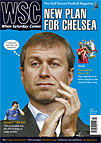 The title race was over by Christmas, but in the end it wasn't that bad a season in League Two, writes Ron Hamilton
The title race was over by Christmas, but in the end it wasn't that bad a season in League Two, writes Ron Hamilton
Over recent seasons it has become an increasingly popular pastime for League Two aficionados to point and sneer at the lopsided and avaricious Premier League, scoffing at the hype and hoopla in comparison to the somewhat earthier charms of football’s basement division. Yet while much of this scorn is predicated on the assumption that the lower leagues represent the last vestiges of football’s soul, the 2007-08 season has seen the fourth division’s occupation of the moral high ground somewhat undermined.
For starters, financial imbalance played as significant a role here as anywhere else. From the outset, the division’s comparative financial powerhouses – MK Dons and Peterborough – looked certain for promotion, the former occupying top spot unrelentingly from September onwards and the latter throwing money at anything that moved. At the other end of the table, both Mansfield and Wrexham’s relegations can be traced to years of financial maladministration. Players, too, showed they could be as lazy and self-interested at the bottom rung of the ladder as anywhere else. Scott Rendell jumped aboard the Peterborough gravy-train from local rivals Cambridge United, then set about bleating incessantly about his dislike for his former club. Meanwhile, as the gap between the teams in the play-offs and those in mid-table grew wider, the overall standard of play seemed to have dropped from recent years with the kind of journeyman old pros the division once thrived on increasingly playing as if this whole League Two business was simply ghastly and beneath men of their stature.
These are, however, but minor gripes compared to the one element that grated most about the division, namely the presence of an unloved franchise at the top of the table. Short of drawing up a “real” league table containing only 23 clubs, it is hard to avoid accepting the fact that Paul Ince’s side were the outstanding team in the division and, with players such as Lloyd Dyer and Keith Andrews excelling, they more than deserved promotion. Despite this, the fact that they were afforded such an easy ride by much of press rankled with many.
Gallingly, there was a spell in March during which Pete Winkelman gurned out gleefully from national newspapers, lauding the success of his exercise in franchising. Journalists spent this period wilfully misconstruing his offer to “return” the history of Wimbledon to AFC Wimbledon. This was spun as an act of startling benevolence, rather than a belated and tokenistic stab at reparation for the cynical land-grab four years previously. It can only be hoped that their flirtation with upward mobility is short-lasting.
Still, 2007-08 wasn’t all doom and gloom. Average attendances were back up after a slight slump, with the caveat that this was largely due to the anomalous example of Bradford and their sensible pricing policy (which ensured an average gate that was 8,000 higher than all bar Milton Keynes). Similarly, for all that many of the old stagers floating around the division looked jaded and uninterested, former Conference players such as Peterborough’s Aaron McLean and Craig Mackail-Smith excelled, illustrating that there remains a well of young and, more significantly, hungry talent outside the Football League to be tapped.
Youth and ambition were also the traits that characterised a number of the more successful managers. Only three of the top ten had bosses aged over 40. Of these, Darren Ferguson attracted the most attention, for reasons that are self-explanatory. At the other end of the budgetary scale, Stockport’s Jim Gannon and Keith Hill of Rochdale guided their respective teams to Wembley – the former triumphing narrowly – while Mark Robins fared well against a background of ongoing financial turmoil at Rotherham. That said, the outstanding achievement was that of the division’s elder statesman, Hereford’s Graham Turner, in patching together a squad of loan signings and free transfers to snatch the third promotion place, securing a deserved manager of the year trophy into the bargain.
All things considered, 2007-08 wasn’t a great season for League Two, but neither was it a dreadful one. It may not be the moral haven some suppose it to be, players may be as surly and chairman as erratic as anywhere else and we have had to endure a season of MK Dons success – but at least our games still kick off at the normal time.
From WSC 257 July 2008